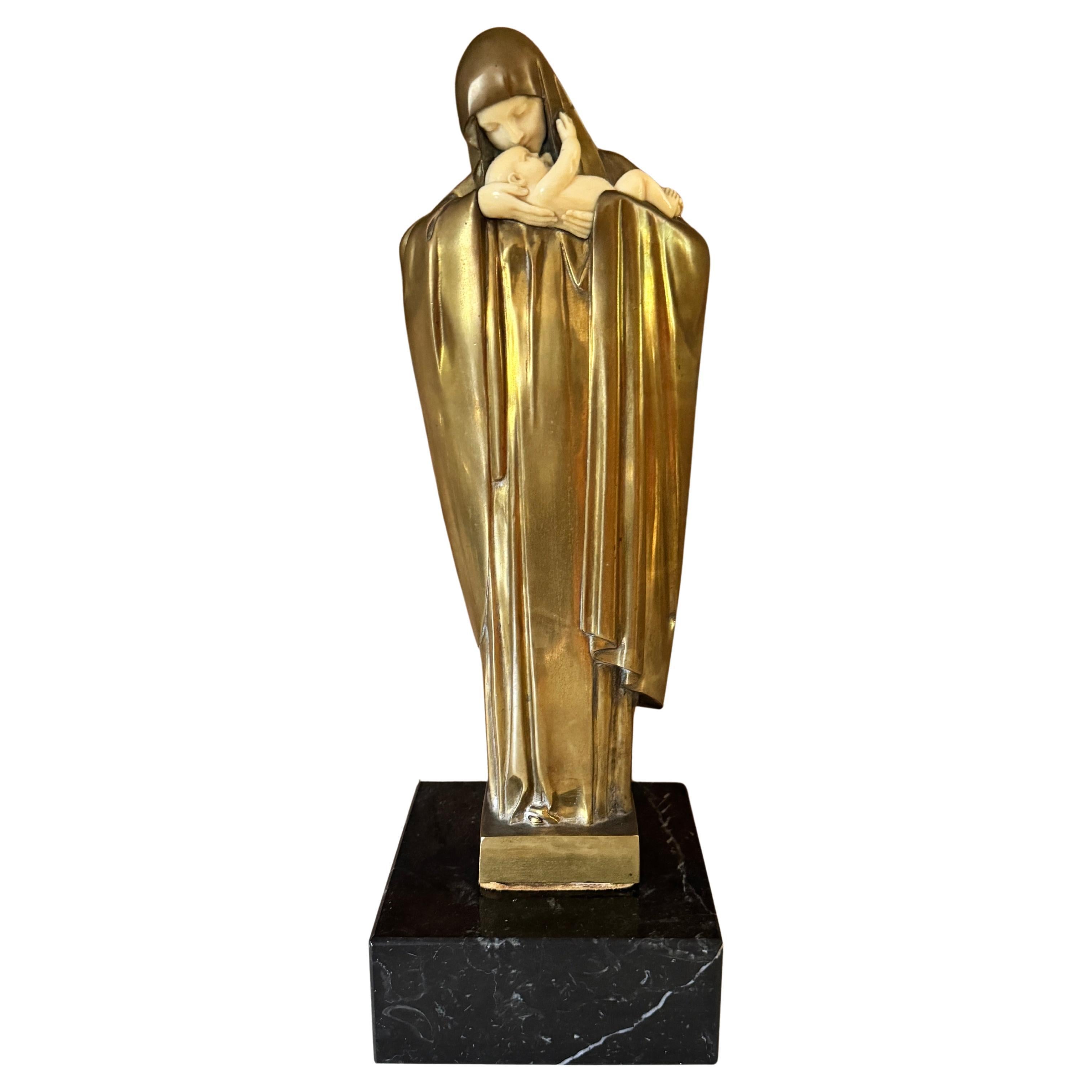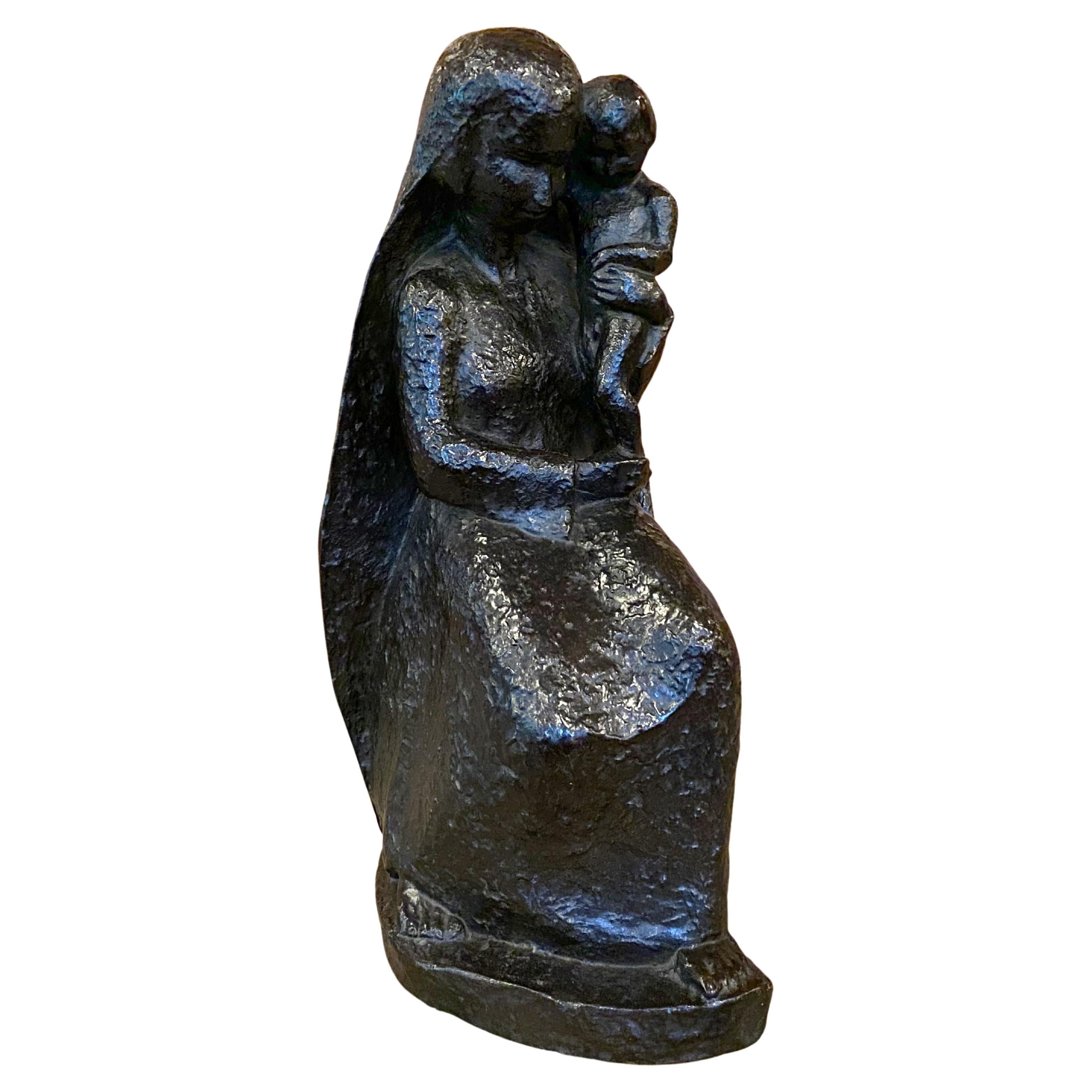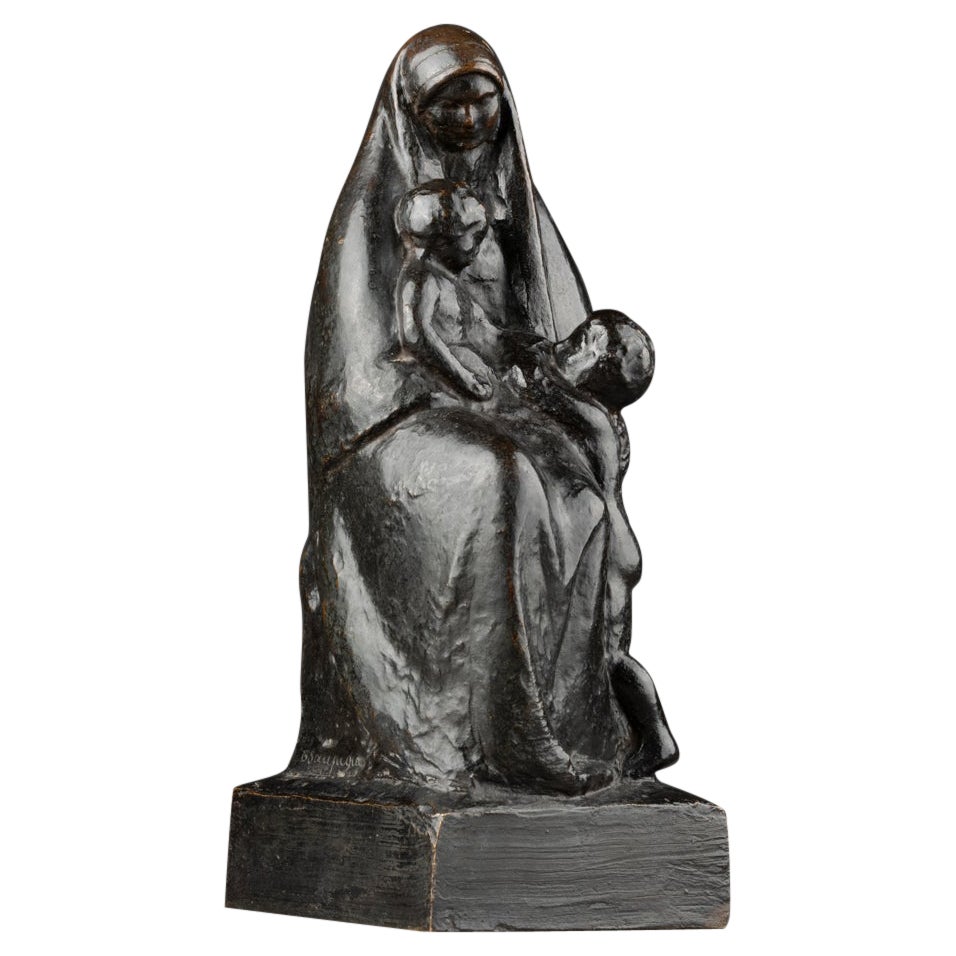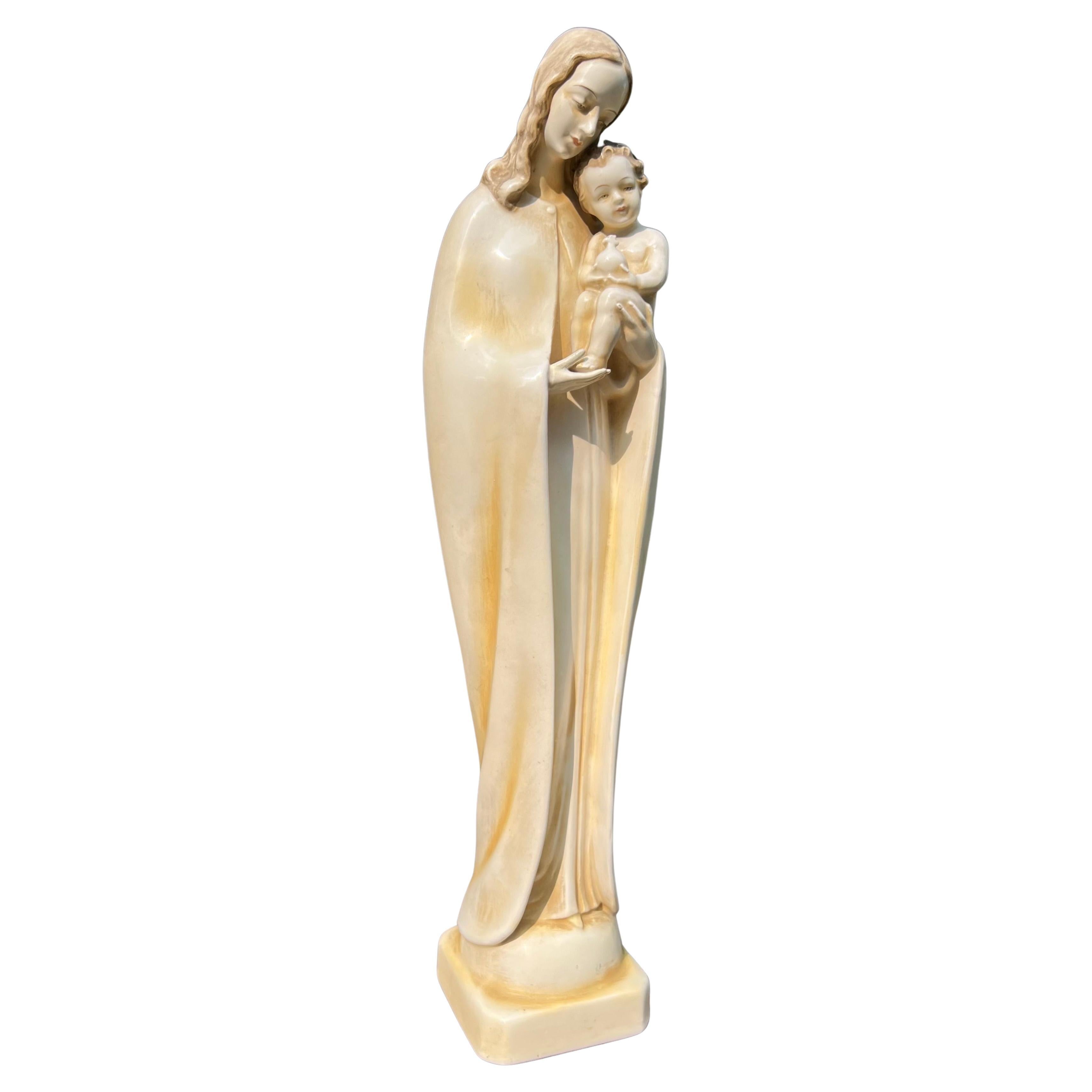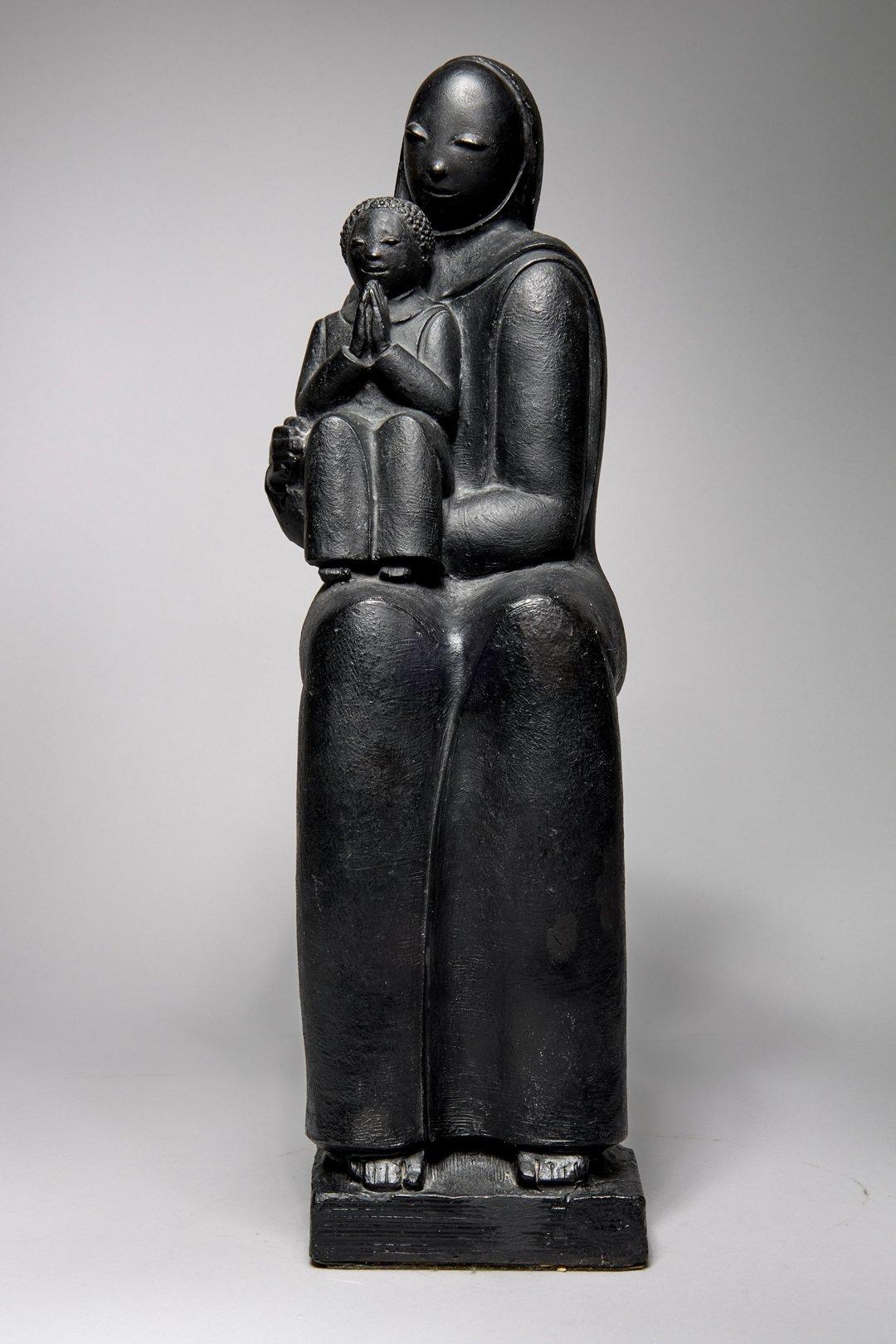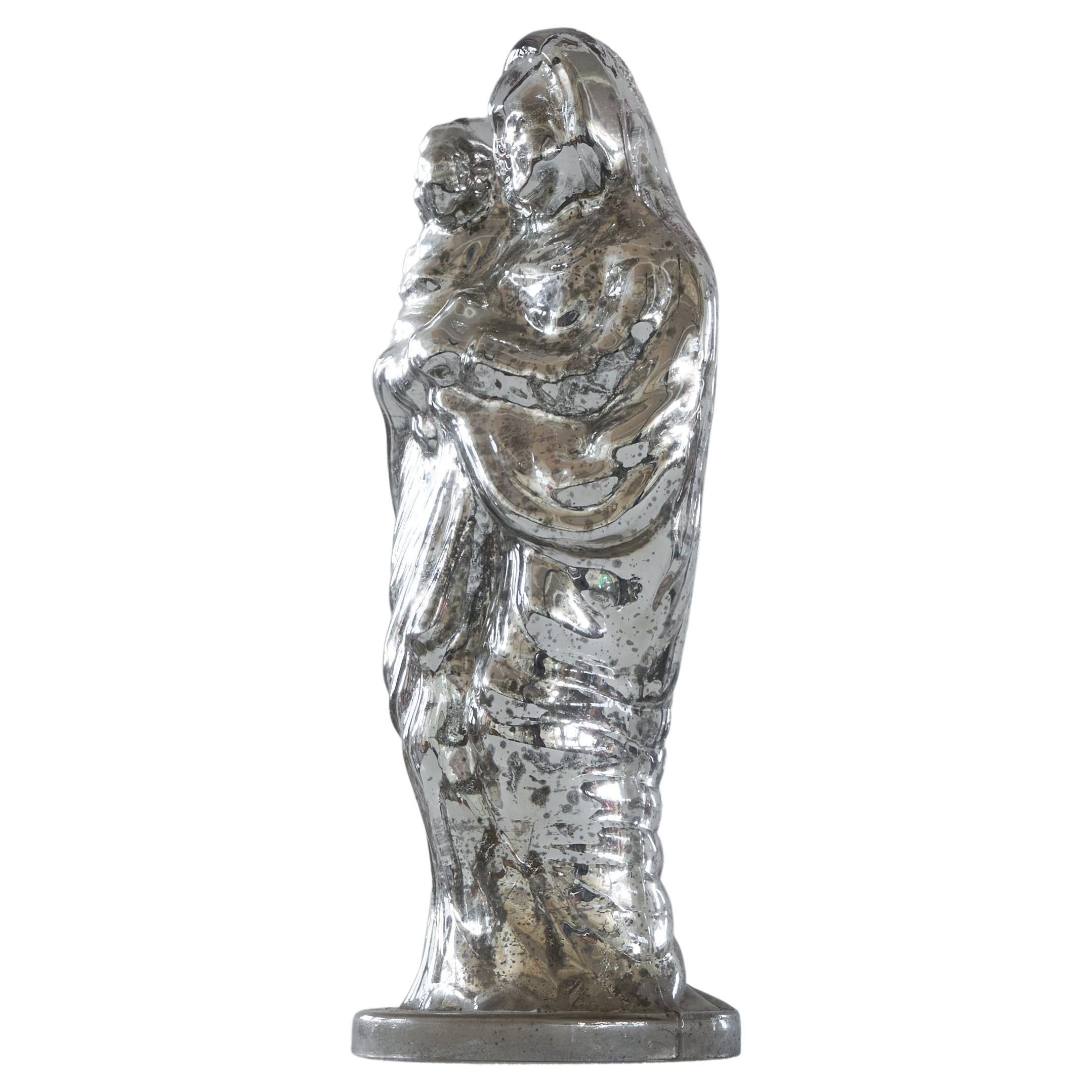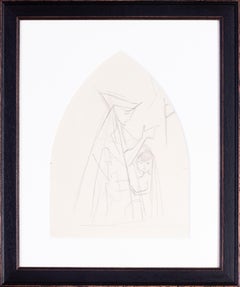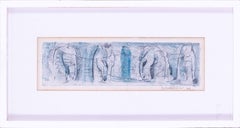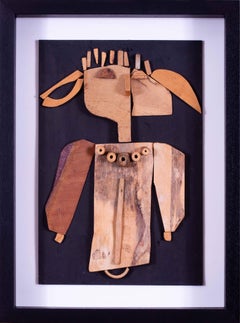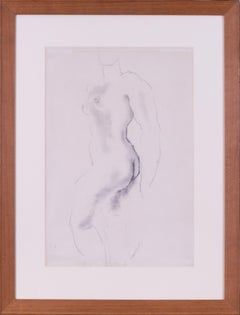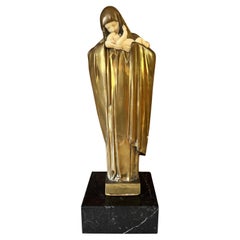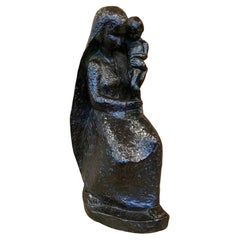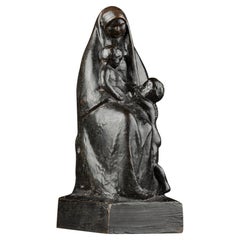Items Similar to Jacob Epstein, 1950, Madonna and Child, lead sculpture, signed, British
Want more images or videos?
Request additional images or videos from the seller
1 of 9
Sir Jacob EpsteinJacob Epstein, 1950, Madonna and Child, lead sculpture, signed, British1950
1950
$25,973.09
£19,000
€22,195.43
CA$36,218.17
A$39,689.94
CHF 20,726.91
MX$476,964.56
NOK 259,122.44
SEK 244,393.75
DKK 165,664.13
About the Item
Jacob Epstein (British / American 1880 – 1959)
Madonna and Child, 1950
Sculpture (lead with bronze halos)
34cm.
In a bespoke carved oak devotional niche
Signed ‘Epstein’ (on the reverse)
Notes: Silber 437
Exhibition: London, Leicester Galleries, Fifty Years of Bronzes and Drawings by Sir Jacob Epstein (1880 – 1959), 10 June – 7 July 1960 #50 (Another Cast); Rye, Art Gallery, Jacob Epstein: Sculpture, Paintings and Drawings, 20 September – 9 October 1965, #19 (Another cast); Rutherford (N.J.), Farleigh Dickinson University, Exhibition of Sir Jacob Epstein’s Work: From the collection of Mr Edward P. Schinman, 19 Feb – 1 April 1967 (another cast)
This maquette was reputed to be made from lead retrieved from the roofs of buildings destroyed in the Blitz, like a phoenix from the ashes. Not only are they a reminder of tragic and difficult times, but perhaps they signify a pure rebirth and defiance against the evil wrought by the Nazi regime.
The maquettes are smaller versions of the major work that adorns the former convent of the Holy Child Jesus in Cavendish Square, London. Epstein had been chosen over Henry Moore and John Skeaping to undertake the project.
Sadly and ironically, even after all that had happened in the holocaust, there were factions of little Britain who objected to Epstein, a Jew, sculpting the faces of The Madonna and Jesus, as if nothing had been learnt from the recent cataclysm of war and hate. It is no wonder that Madonna and Child is regarded as an iconic work by Epstein, reproduced in books almost as often as the young sculptor’s shocking ‘Rock Drill’, now housed in the Tate Gallery.
To those who objected to Epstein’s involvement in this project, it is to be noted that the non-Catholic sculptor and the nuns of the Convent developed a sense of enormous mutual respect, succinctly expressed in a passage he wrote to the Reverand Mother…’the reward is that I had the opportunity to do a lasting work, carrying a spiritual message to all. ‘
- Creator:Sir Jacob Epstein (1880-1959, American, British)
- Creation Year:1950
- Dimensions:Height: 13.38 in (33.99 cm)Width: 2.5 in (6.35 cm)Depth: 2 in (5.08 cm)
- Medium:
- Movement & Style:
- Period:
- Condition:In good condition. please ask the dealer for further information on the condition.
- Gallery Location:Petworth, GB
- Reference Number:1stDibs: LU540315987572
About the Seller
4.9
Platinum Seller
Premium sellers with a 4.7+ rating and 24-hour response times
Established in 2010
1stDibs seller since 2017
272 sales on 1stDibs
Typical response time: 3 hours
- ShippingRetrieving quote...Shipping from: Petworth, United Kingdom
- Return Policy
Authenticity Guarantee
In the unlikely event there’s an issue with an item’s authenticity, contact us within 1 year for a full refund. DetailsMoney-Back Guarantee
If your item is not as described, is damaged in transit, or does not arrive, contact us within 7 days for a full refund. Details24-Hour Cancellation
You have a 24-hour grace period in which to reconsider your purchase, with no questions asked.Vetted Professional Sellers
Our world-class sellers must adhere to strict standards for service and quality, maintaining the integrity of our listings.Price-Match Guarantee
If you find that a seller listed the same item for a lower price elsewhere, we’ll match it.Trusted Global Delivery
Our best-in-class carrier network provides specialized shipping options worldwide, including custom delivery.More From This Seller
View AllGerman Expressionist drawing by Carl Hofer of a mother and child
By Carl Hofer
Located in Petworth, West Sussex
Carl Hofer (German, 1875 – 1955)
Mother and son
Black crayon on paper
10.1/2 x 7.3/4 in. (26.7 x 20 cm.)
With studio stamp (on the reverse) and signature of the artist’s wife Elizabeth Hofer
Provenance: These works come from the artist’s second wife Elizabeth and from then by descent.
Carl Hofer was a German expressionist painter and the director of the Berlin Academy of Fine Arts. One of the most important painters of the Expressionist movement, his work was among those that was considered degenerate art by the Nazis. He studied in Karlsruhe under Hans Thoma. He first visited Paris in 1899 making acquaintance with Julius Meier-Graefe. In 1902 he studied in Stuttgardt and became friends with the sculptor Hermann Haller...
Category
20th Century Expressionist Figurative Drawings and Watercolors
Materials
Paper, Crayon
Sven Berlin, British 20th Century, For sculpture of horse' head, monotype
Located in Petworth, West Sussex
Sven Berlin (British, 1911 – 1999)
For sculpture of horse’s head
Signed and dated ‘Sven Berlin 49’ (lower right)
Monotype
5 x 16.1/2 in. (12.7 x 42.7 cm.)
Provenance: Porthmeor Galle...
Category
20th Century Modern Animal Prints
Materials
Monotype
Wood collage mid 20th Century figurative work by British artist Ewart Johns
Located in Petworth, West Sussex
A very original and striking wood collage work by Modern British artist Ewart Johns
Ewart Johns (British, 1923 – 2013)
Forest Figure
Wood collage
Executed circa 2006
19 x 14.1/8 in....
Category
20th Century Abstract Nude Paintings
Materials
Wood
Black crayon drawing of a nude by Modern British artist Frank Dobson
By Frank Dobson
Located in Petworth, West Sussex
Frank Dobson (British, 1886 – 1963)
‘Standing nude’
Black crayon on paper
Signed `FRANK DOBSON` (lower right)
19.3/4 x 13.1/8 in. (50.3 x 33.3 cm.)
Exhibited: Chris Beetles Gallery, ...
Category
20th Century Modern Nude Drawings and Watercolors
Materials
Paper, Crayon
German expressionist drawing by Carl Hofer' Whispering'
By Carl Hofer
Located in Petworth, West Sussex
Carl Hofer (German, 1875 – 1955)
Einflusterung (Whispering)
Charcoal and pencil on paper
Signed and inscribed ‘Einflusterung’ (lower middle)
17.1/4 x 13.3/8 in. (43.8 x 34 cm.)
Provenance: These works come from the artist’s second wife Elizabeth and from then by descent.
Carl Hofer was a German expressionist painter and the director of the Berlin Academy of Fine Arts. One of the most important painters of the Expressionist movement, his work was among those that was considered degenerate art by the Nazis. He studied in Karlsruhe under Hans Thoma. He first visited Paris in 1899 making acquaintance with Julius Meier-Graefe. In 1902 he studied in Stuttgardt and became friends with the sculptor Hermann Haller...
Category
20th Century Expressionist Figurative Drawings and Watercolors
Materials
Paper, Charcoal
Signed and dated watercolour painting by Henry Moore, 1981 'Four ideas'
Located in Petworth, West Sussex
Henry Moore O.M., C.H. (British, 1898-1986)
Four Ideas for Sculpture
Signed and dated ‘Moore/81’ (lower right)
Pencil, watercolour, crayon, charcoal and ball point pen on paper
24.5 ...
Category
20th Century Abstract Abstract Drawings and Watercolors
Materials
Paper, Charcoal, Crayon, Watercolor, Pencil
You May Also Like
Lucienne Heuvelmans patinated bronze Art Deco statue Madonna & Child
By Lucienne Heuvelmans 1
Located in CASTENRAY, NL
Notre-Dame d'Espérance / Our Lady of Hope.
A wonderful patinated bronze sculpture by Lucienne Antoinette Heuvelmans (Paris 1885-1945) c. 1920.
The sculpture is gilded bronze and c...
Category
Vintage 1910s French Art Deco Figurative Sculptures
Materials
Bronze
20th Century Bronze Madonna with Child
Located in Esbeek, NL
20th century sitted bronze Madonna with child.
Category
Early 20th Century European Figurative Sculptures
Materials
Bronze
Georges Saupique : "maternity" Patinated Bronze, Valsuani fondry C. 1930
By Georges Saupique
Located in SAINT-OUEN-SUR-SEINE, FR
Georges SAUPIQUE (1889-1961, France): "Maternity"
Bronze proof with brown patina Old edition lost wax casting
Signed "G. Saupique" by engraving
Bears the founder's stamp "C Va...
Category
Vintage 1920s French Art Deco Figurative Sculptures
Materials
Bronze
Refined Madonna and Child Statue – c. 1950 – West Germany – Signed HM
Located in Antwerp, BE
Refined Madonna and Child Statue – c. 1950 – West Germany – Signed HM
An exquisite mid-century ceramic statue depicting the Virgin Mary and ...
Category
Mid-20th Century German Religious Items
Materials
Ceramic
Mother and Child, Mid-20th Century sculpture, Cleveland School Artist
Located in Beachwood, OH
Walter Sinz (American, 1881-1966)
Mother and Child, 1949
Plaster
Signed and dated on base
23.5 x 6 x 9 inches
Walter A. Sinz was an American sculptor born in Cleveland, Ohio on Jul...
Category
1940s Figurative Sculptures
Materials
Plaster
Large Antique Patinated Mercury Glass Madonna with Child
Located in Tilburg, NL
Antique patinated Mercury glass Madonna with child. Turn of the century / early 20th century.
This is a wonderful and large mercury glass Madonna with child figurine...
Category
Early 20th Century Unknown Aesthetic Movement Figurative Sculptures
Materials
Glass, Mercury Glass
